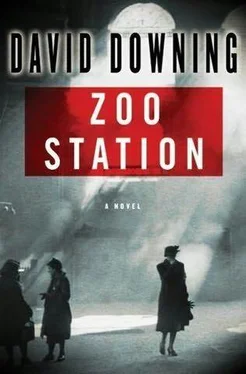David Downing - Zero Station
Здесь есть возможность читать онлайн «David Downing - Zero Station» весь текст электронной книги совершенно бесплатно (целиком полную версию без сокращений). В некоторых случаях можно слушать аудио, скачать через торрент в формате fb2 и присутствует краткое содержание. Жанр: Шпионский детектив, на английском языке. Описание произведения, (предисловие) а так же отзывы посетителей доступны на портале библиотеки ЛибКат.
- Название:Zero Station
- Автор:
- Жанр:
- Год:неизвестен
- ISBN:нет данных
- Рейтинг книги:5 / 5. Голосов: 1
-
Избранное:Добавить в избранное
- Отзывы:
-
Ваша оценка:
- 100
- 1
- 2
- 3
- 4
- 5
Zero Station: краткое содержание, описание и аннотация
Предлагаем к чтению аннотацию, описание, краткое содержание или предисловие (зависит от того, что написал сам автор книги «Zero Station»). Если вы не нашли необходимую информацию о книге — напишите в комментариях, мы постараемся отыскать её.
Zero Station — читать онлайн бесплатно полную книгу (весь текст) целиком
Ниже представлен текст книги, разбитый по страницам. Система сохранения места последней прочитанной страницы, позволяет с удобством читать онлайн бесплатно книгу «Zero Station», без необходимости каждый раз заново искать на чём Вы остановились. Поставьте закладку, и сможете в любой момент перейти на страницу, на которой закончили чтение.
Интервал:
Закладка:
“Bastards all,” Slaney summed up. “I see Chamberlain’s on his way to see the Duce”-he pronounced it Dootch-“in Rome. On some train called the Silver Bullet.”
Russell laughed. “It’s the Golden Arrow.”
“Whatever. A week with Mussolini. I hope he likes parades.”
“What’s he going for?” Peyton asked.
“God knows. You’d think that by now someone in London would have noticed that the Duce is a man of moods. If he’s feeling good he’ll promise the world, set their Limey minds at rest. If he isn’t, he’ll try and scare the pants off ’em. Whichever he does, he’ll be doing the opposite before the week’s out.”
“Pity his German chum isn’t a bit more mercurial,” Manning offered. “Once he gets his teeth into something, it stays bitten.”
“Or swallowed, in the Jew’s case,” Russell added. “Why the hell isn’t Roosevelt doing more to help the Jews here?”
“He’s building up the Air Corps,” Peyton said. “There was another announcement over the weekend.”
“Yes, but that won’t help the Jews.”
“He can’t,” Slaney said. “Too much domestic opposition.”
Russell wasn’t convinced. “The British are doing something. Nothing like enough, I know. But something.”
“Two reasons,” Manning said. “One, and most important-they just don’t get it back in Washington. Or out in the boonies. When Americans think about German Jews having a hard time, the first thing they think about is what American Jews have to put up with-restricted golf clubs, stuff like that. When they realize that Hitler doesn’t play golf, they still find it hard to imagine anything worse than the way we treat our negroes. Sure, the negroes are condemned to segregation and poverty, but lynchings are pretty rare these days, and the vast majority get a life that’s just about livable. Americans assume it’s the same for the German Jews.”
“What about the concentration camps?” Russell asked.
“They just think of them as German prisons. A bit harsh, maybe, but lots of Americans think our prisons should be harsher.” He shrugged and took a gulp of beer.
“The second reason?” Russell prompted.
“Oh, that’s easy. A lot of Americans just don’t like Jews. They think they’re getting their comeuppance. If they had any idea just how harsh that comeuppance some of them might, might, have second thoughts, but they don’t.”
“I guess that’s down to us.”
“Us and our editors,” Slaney said. “We’ve told the story often enough. People just don’t want to hear it. And if you keep on and on about it they just turn off.”
“Europe’s far away,” Manning said.
“And getting farther,” Slaney added. “Jesus, let’s think about something pleasant for a change.” He turned to Russell. “John, I’m organizing a poker night for next Tuesday. How about it?”
The foursome emerged into the daylight soon after 3:00, and went their separate ways-Peyton to his mistress, Slaney and Manning to write their copy for the morning editions. Russell, walking south down Wilhelmstrasse, made the impulsive decision to drop in on Sturmbannfьhrer Kleist while he was still in the neighborhood. A small voice in his head protested that the Sicherheitsdienst was best encountered stone-cold sober, but it was promptly drowned out by a louder one insisting that there was nothing to be afraid of. The meeting was just a formality. So why not get it over with?
The fresh-faced blond receptionist seemed pleased enough to see him, gesturing him through to an anteroom with the sort of friendly smile that could soften up any man. Sunk into one of the leather chairs, Russell found himself staring at the latest product of the Propaganda Ministry’s poster artists: Hitler complete with visionary stare and catchy slogan-EIN VOLK, EIN REICH, EIN FUHRER. On the opposite wall a more colorful poster showed apple-cheeked youth frolicking in the Alps. That was the thing about these people, he thought: They never surprised you.
The minutes dragged by; the later pints of beer pressed ever-harder for release. He went back out to the receptionist, who pointed him in the direction of a toilet with the same sunny smile. The toilet was spotless and smelled as if it had just been hosed down with Alpine flowers. One of the cubicles was occupied, and Russell imagined Heydrich sitting with his breeches round his ankles, reading something Jewish.
Back in the ante-room he found company. A man in his sixties, smartly dressed. They exchanged nods, but nothing more. The man shifted nervously in his seat, causing the leather to squeak. Hitler stared at them both.
After about twenty minutes the sound of clicking heels seeped into the silence, and another young blonde appeared in the doorway. “Herr John Russell?” she enquired. “Follow me, please.”
They went down one long corridor, up some steps, down another corridor. All Russell could hear was the rhythmic click of the blonde’s shoes. No sounds escaped through the numerous doors they passed, no talk, no laughter, no typewriters. There was no sense that the building was empty, though, more a feeling of intense concentration, as if everyone was thinking fit to burst. Which, Russell realized, was absurd. Maybe the SD had a half-term break, like British schools.
Through the window on a second flight of stairs he caught a glimpse of a large lawn and the huge swastika flying over Hitler’s new home. At the end of the next corridor the heels swung right through an open doorway.
Room 48 was not so much a room as a suite. The secretary led him through her high-ceilinged anteroom, opened the inner door, and ushered him in.
Sturmbannfuhrer Gottfried Kleist-as the nameboard on the desk announced-looked up, gestured him to the leather-bound seat on the near side of his leather-bound desk, and carried on writing. He was a stout man in denial, his black uniform just a little too tight for what it had to contain. He had a florid face, thinning hair and rather prominent red lips. He did have blue eyes, though, and his handwriting was exquisite. Russell watched the fountain pen scrape across the page, forming elegant whorls and loops from the dark green ink.
After what seemed like several minutes, Kleist carefully replaced the pen in its holder, almost daintily blotted his work and, after one last admiring look, moved it to the right hand side of his desk. From the left he picked up a folder, opened it, and raised his eyes to Russell’s. “John Russell,” he said. It wasn’t a question.
“You asked to see me,” Russell said, with as much bonhomie as he could muster.
The Sturmbannfьhrer ran a hand through his hair, straightening a few rebellious wisps with his fingers. “You are an English national.”
“With resident status in the Reich.”
“Yes, yes. I know. And a current journalistic accreditation.”
“Yes.”
“Could I see it please?”
Russell removed it from his inside jacket pocket and passed it over.
Kleist noticed the invitation card. “Ah, the opening,” he said. “A success, I assume. Were you impressed?”
“Very much so. The building is a credit to the Fьhrer.”
Kleist looked sharply at Russell, as if doubtful of his sincerity.
“So much modern architecture seems insubstantial,” Russell added.
“Indeed,” Kleist agreed, handing back the press pass. Apparently satisfied, he sat back in his seat, both hands grasping the edge of his desk. “Now, it has come to our attention that the Soviet newspaper Pravda has commissioned you to write a series of articles about the Fatherland.” He paused for a moment, as if daring Russell to ask how it had come to their attention. “This was at your suggestion, I believe.”
“It was.”
“Why did you suggest these articles, Mr. Russell?”
Читать дальшеИнтервал:
Закладка:
Похожие книги на «Zero Station»
Представляем Вашему вниманию похожие книги на «Zero Station» списком для выбора. Мы отобрали схожую по названию и смыслу литературу в надежде предоставить читателям больше вариантов отыскать новые, интересные, ещё непрочитанные произведения.
Обсуждение, отзывы о книге «Zero Station» и просто собственные мнения читателей. Оставьте ваши комментарии, напишите, что Вы думаете о произведении, его смысле или главных героях. Укажите что конкретно понравилось, а что нет, и почему Вы так считаете.












